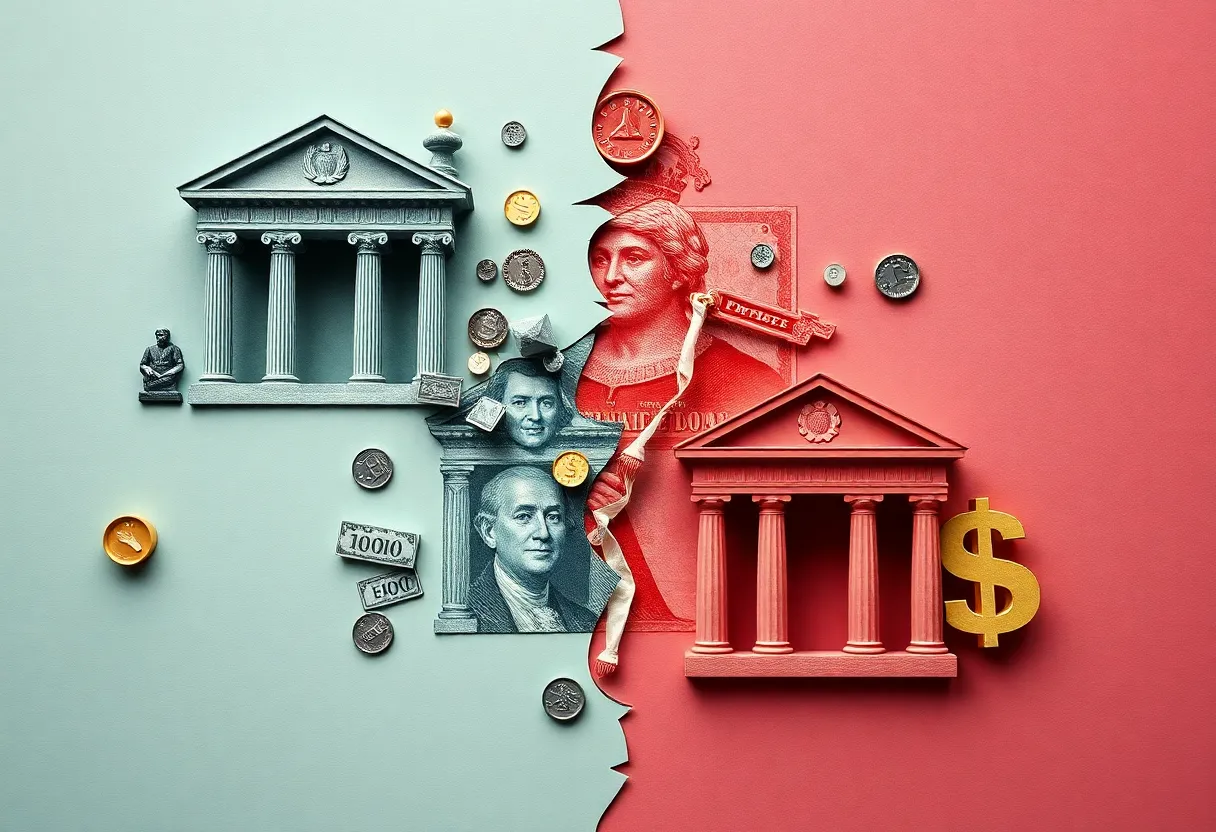News Summary
Former President Donald Trump accuses JPMorgan Chase and Bank of America of denying him banking services due to his conservative beliefs. He claims JPMorgan gave him a tight deadline to move large sums and that Bank of America refused to accept a substantial deposit. This has raised concerns about political discrimination in banking practices, with both banks denying such claims and attributing their actions to federal regulations. As discussions escalate, Trump plans to issue an executive order to investigate banking biases and ensure equitable treatment for all clients.
Trump’s Claims of Banking Discrimination Spark Controversy
Former President Donald Trump is making headlines once again. This time, he’s directed his attention toward big banks, specifically JPMorgan Chase and Bank of America. Trump alleges that both institutions have rejected him as a customer due to his conservative beliefs, raising eyebrows across the financial industry.
What Happened?
During an appearance on CNBC’s “Squawk Box,” Trump revealed some intriguing details about his banking experiences. He claimed that JPMorgan Chase gave him a tight 20-day deadline to move “hundreds of millions of dollars” to another institution, though he didn’t indicate exactly when this happened. In a separate incident, he also attempted to open an account with Bank of America to deposit over 1 billion dollars, only to be turned away. These rejections, he expressed, have left him feeling that conservative clients are being unfairly treated by major banks.
Spreading His Wealth
In light of the rejections from these banking giants, Trump mentioned that he has opted to diversify his funds by spreading them across smaller banks, making deposits of around $10 million at various locations. This move points to a growing concern among certain groups that they are being unfairly “de-banked” due to political affiliations.
Market Reaction
Interestingly, without missing a beat, the shares of both JPMorgan Chase and Bank of America saw a drop of over 1% during the afternoon trading session following Trump’s comments. It sparks curiosity about how political statements can ripple through financial markets.
The Bigger Picture
Trump’s claims come amidst a broader conversation about political discrimination in banking, particularly from conservative circles, crypto executives, and numerous religious organizations. They argue that their beliefs and affiliations are causing them to face discrimination when it comes to banking practices.
Bank Responses
Despite the accusations, both banks firmly deny practicing discrimination based on political or religious beliefs. They insist that their actions are entirely based on complying with federal regulations designed to combat financial crimes, such as money laundering. Moreover, representatives from JPMorgan asserted they do not close accounts for political motives, although they do agree on the importance of regulatory reform.
Political Tensions
Trump’s allegations are not entirely new, as they echo past complaints from conservative figures about bias from financial institutions. In January, he specifically targeted Bank of America’s CEO, accusing him of denying services to conservative clients. His ongoing accusations have led to concerns that financial institutions are succumbing to pressure from the current administration aimed at undermining Trump and like-minded individuals.
What’s Next?
As the situation escalates, Trump is reportedly preparing to issue an executive order that threatens penalties against banks if they choose to drop customers over political reasons. This order could instruct regulators to investigate claims under laws like the Equal Credit Opportunity Act. A trade group representing large banks has attributed these “de-banking” issues to what they label as “regulatory overreach” instead of bias, expressing optimism that Trump’s executive order will address existing regulatory frameworks effectively.
Further Complications for Trump
It’s important to note that Trump has had his share of legal troubles with banks, such as a lawsuit against Capital One, where he asserts improper account closures. These issues raise important questions concerning his banking relationships with different institutions.
The Broader Implications for Banking
The current banking landscape seems to be shaped significantly by regulatory pressures rather than outright political discrimination. As banks remain cautious in their dealings with high-profile clients, the financial community keeps a keen eye on how such claims and policies unfold. Historical patterns suggest that squabbles between the political and financial sectors are far from uncommon, particularly regarding sensitive industries associated with oil, gas, and firearms.
Conclusion
Regardless of one’s stance on Trump’s allegations, the discussion surrounding banking practices and political affiliations is likely to continue gaining momentum. As the executive order looms and banks strive to clarify their positions, it remains to be seen how this will reshape the relationship between finance and politics in the foreseeable future.
Deeper Dive: News & Info About This Topic
- Wall Street Journal
- CNBC
- Politico
- Al Jazeera
- The New York Times
- Wikipedia: Banking Regulation
- Google Search: banking discrimination
- Google Scholar: Trump banking discrimination
- Encyclopedia Britannica: Banking
- Google News: Trump banks discrimination

Author: STAFF HERE LOS ANGELES WRITER
The LOS ANGELES STAFF WRITER represents the experienced team at HERELosAngeles.com, your go-to source for actionable local news and information in Los Angeles, Los Angeles County, and beyond, specializing in "news you can use" with coverage of product reviews for personal and business needs, local business directories, politics, real estate trends, neighborhood insights, and state news affecting the area—with deep expertise from years of dedicated reporting and strong community input, including local press releases and business updates, while delivering top reporting on high-value events like the Academy Awards, LA Auto Show, and Los Angeles Marathon, extending coverage to key organizations such as the Los Angeles Area Chamber of Commerce and the Los Angeles Tourism & Convention Board, plus leading businesses in entertainment and technology like Warner Bros. and SpaceX, and as part of the broader HERE network including HEREAnaheim.com , HERECostaMesa.com , HEREHuntingtonBeach.com , and HERESantaAna.com , providing comprehensive, credible insights into Southern California's dynamic landscape. HERE Anaheim HERE Beverly Hills HERE Coronado HERE Costa Mesa HERE Hollywood HERE Huntington Beach HERE Long Beach HERE Los Angeles HERE Mission Viejo HERE San Diego HERE Santa Ana





